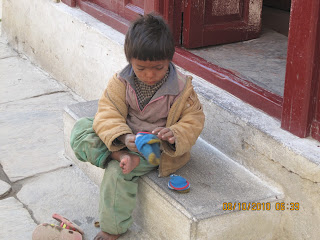Jomson to Marpha and on to Tatopani where we overnight, and on to Pokhara
An early morning start to our return journey began with a good breakfast, and well filled 4x4 tanks. We had a long journey ahead of us, some 9 hours of sandy mountain roads with the Kaligandaki River below. Some preferred to have the Nepali drivers as the return of the memory to our minds of the accident on this road was a little too off putting. Everyone in the team needed to be happy with an arrangement that enjoyment of the trip would be a pleasure to all.
We made our way to Marpha which was a large village with tightly packed homes. We visited the largest Tibetian Monastery (Buddhist) and meditation centre in the Anapurna region. Here ancient traditions continued as if modern life had not touched the inner sanctuary on this quiet and spiritual abode. Monks explained many things and answered questions. The organisers gave each of us a stamped post card to send home. I thought that a kind and interesting thought. We walked around the village to do some shopping and finished at a tea house and lodge where we were served delicious apple juice. This is the apple growing area for Nepal. Te village was built of stone and homes had the piles of wood on walls and roofs. The closing winter would bring deep snow and village homes are warmed, and food cooked using simple wooden fires. We had seen in the home where we stayed in Titi Village that once the cooking was done, the wood was removed from the fire for use the following day. This conservation testified to a sensitivity to the resource but over the last fifty years much deforestation had taken place in Nepal. Durga Pokerel had bee instrumental in providing solar heating discs to some villages in an endeavour to assist with alternative cooking methods. In Nepal, the amount of wood a home has is the indication of wealth of the family. Winters become so cold that the livestock is brought under roofs in rooms adjoining or under the homes of the villager. On the top floor of flat roofed houses, drying of beans, corn and rice as well as fruits and herbs takes place.
Our trip continued and we reached Tatopani in the evening. The hot springs were lit with candles and those who took to the spring water relaxed and enjoyed cheerful chats into the late evening. We arose early, once more and made our way to the 4x4's. Marion and I having taken a long walk along the mountain road to return to some rather worried members waiting for us. Still Marion was not ready to drive with our team even though we had a good Napalese driver and she was taken into the lead vehicle with Team Ganesh. One member was very weak with diarrhoea and Melka came to assistance having to set her up with a drip. Our leaders handed over the guiding of the tour to each team for a given period of time and entertainment amongst those in the 4x4's using the walkie talkies rested with the respective teams. At one stop over we had a small activity which gave us a break. We were asked to have a relay race carrying ten litres of water in a basket from our heads the Napalese way. Not very comfortable! We left the mountain people, and made our way through Beni, Kusma and Naudanda.
We reached Pohhara in the late evening and, with barely time to address housekeeping issues, had to meet the taxis set to take us into the town for some late night tourist shopping which would be followed by an evening meal in a restaurant. Pokhara is in a beautiful wide flat valley surrounded by hills, lakes, forests, rivers, waterfalls, caves and fields. It lies 200km west of Kathmandou. We were back at the same hotel, Pokhara Grande Hotel, which was beautiful by any western standard. A luxury, it was, to enjoy a good bath, rest our heads on to clean linen and the following morning, a good buffet breakfast.
A surprise again? We were given little information but climbed onto a coach and drove to Phewatal where a boating race was to take place. I last rowed a canoe as a 12yr old! These were big heavy wooden boats. Our team was not last! Perhaps Team Fishtail were being kind to let us in to the finish before they came in. The boat race finished at the banks of the small island which was more of a mountain sticking out of the lake. Our boats were met by Smadar who gave each one a small leaf jar, 'padjar', which contained oil which she lit that we could leave in the water to float away. We had a very steep climb ahead. The thought of leeches to attach themselves to any resting feet or legs was a new concept for me to think about. Team Fishtail led the climb. The climb through damp forested slopes, brought us to the Hindu temple where we enjoyed a most breathtaking view, sat on the steps and reflected on the trip, some sharing thoughts and emotions.










No comments:
Post a Comment